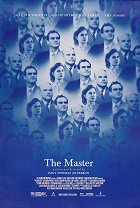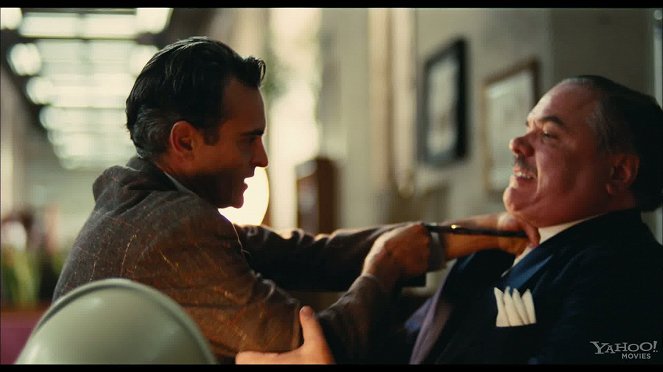Regie:
Paul Thomas AndersonDrehbuch:
Paul Thomas AndersonKamera:
Mihai Malaimare Jr.Musik:
Jonny GreenwoodBesetzung:
Joaquin Phoenix, Philip Seymour Hoffman, Amy Adams, Laura Dern, Ambyr Childers, Rami Malek, Jesse Plemons, Kevin J. O'Connor, Christopher Evan Welch (mehr)Inhalte(1)
Als Ex-Soldat Freddie den charismatischen Lancaster Dodd kennenlernt, ändert sich sein Leben schlagartig. Bisher ertränkte der heimgekehrte Kriegsveteran seine innere Leere mit Alkohol und Frauen, aber durch Dodd findet Freddie wieder Halt im Leben: Der selbsternannte Philosoph hat eine eigene, rasch wachsende Glaubensgemeinschaft gegründet und wird von seinen Anhängern nur "Meister" genannt. Der labile Freddie ist fasziniert von seinen Lehren und steigt zu Dodds rechter Hand auf - scharf beobachtet von dessen berechnender und eiskalter Frau Peggy. Doch bald entstehen bei Freddie erste Zweifel an den totalitären Methoden und Lehren des "Meisters"… (Senator Film Verleih)
(mehr)Kritiken (7)
When it ended, this thoughtfully “non-didactic” film left me in exactly the opposite state of mind as Django Unchained – drained, helpless, empty. I don’t know – and maybe I don’t even want to know – how much Joaquin Phoenix, as a lunatic without a cause, owes his acting performance to the directing and how much to his own psychopathy, but the fact remains that I have not seen anyone perform with such self-destructive dedication in a long time. This may be because so many contemporary directors let actors perform solely with their faces, fewer with the rest of their bodies. Even if I got nothing else out of The Master, it would deserve my five-star rating solely for the performances of Phoenix and Hoffman (who obviously has more control over his acting than his co-star does). ___ However, Paul Thomas Anderson’s least viewer-friendly film to date is stimulating on many other levels, whether that refers to style (long, increasingly unbalanced shots that leave how we approach them up to us) or meaning (the unending search for a leader, the obsessive need for a goal). In conflict with their usual purpose, the long shots with great depth of field do not contribute to greater transparency but, on the contrary, to the feeling of being imprisoned in a universe that is outwardly real yet bizarre in the manner of David Lynch’s films. In a similarly ironic way, the “epic” 70 mm format is repeatedly used for large close-ups of faces, which sprawl across the entire screen as if they were landscapes that Anderson wants to traverse. ___ It seems to me that the crisis of masculinity and the issue of men with empty lives and no clear goals were last addressed in a comparably suggestive way in the films of the Hollywood Renaissance (Five Easy Pieces, The Long Goodbye, Fingers). Anderson, however, takes the issue even further as he makes the search for the roots of this frustration and the strangest ways to overcome it the central theme of the film. He places the unmotivated (non-)hero in the context of a post-war American society longing to return to a status quo that no longer existed. The unsatisfying narrative, with its many deliberate holes and dead spots, is completely subordinate to this desperate search for a clue. Like Freddie in the almost parodic scene in the desert (when heading for a non-existent destination is turned into a fun activity), the film also heads toward a barely visible point somewhere in the distance. And just as Freddie blindly (literally in places) follows Dodd in the belief that he is the true master, the one who could personify his ideal self (see the party scene, which perhaps references the nudie-cutie films of the 1950s), we can also believe that we know where the film is headed. However, there is no master who would confirm or refute our assumptions. Anderson lets the viewer take the lead, thus warning against the susceptibility of a person in any crisis to look for tried-and-tested ways out of their predicament, while also contributing to the considerable variability of the resulting viewer experience. Regarding my own experience with the film, I can write with certainty that it was not pleasant and that I want to repeat it. 90%
()
(weniger)
(mehr)
I resign myself and will try to take a clear stand on this film after watching it once. Phoenix and Hoffman are amazing, and technically, the film is brilliant. It’s nice to see every now and again in the cinema something different from other Hollywood productions, and The Master is really very, very different; so different that, I must say, it gets a little frustrating. Adding a pinch of classic storytelling would make it a lot more viewer-friendly and the art onanists would still be satisfied. Two assholes behaving like assholes, doing asshole things and talking about asshole things for two and a half hours, without that leading to anything very interesting; it’s missing a catharsis. Rather than confirming its status as an exceptional movie experience, the ending just fades away. But it would be good to watch it one more time – though I don’t really want to…
()
The Master is a weird movie. This was the first thing that came to mind when I was watching the movie and even after I finished it. I was actually feeling a bit weird when I was getting ready to see it, but Joaquin Phoenix was the very reason why I wanted to see the movie. And the result is that Joaquin put in another of his absolutely brutal acting performances with which I only had one problem. I didn’t understand his character at all. You see I don’t think I have ever seen such a psychologically disturbed character in my life. I had no idea what he would do the next minute, which was actually a good thing and he definitely convinced me of what a precise actor he is and that he is willing to do anything for the role. I tip my hat off to him. And naturally I shouldn’t forget about Hoffman, who definitely wasn’t bad, but the whole thing takes place in this strange time in the 1950’s. People behave really strangely, and the whole atmosphere is really strange as well, and what you’re dealing with could be considered a cult. A really strange movie. It’s really hard to form any deeper opinion about it. Let me just add that the music in the movie made me feel really uneasy, which I guess was the point, but it’s also one of the reasons why I cannot go higher than three stars.
()
Ich war lange Zeit nicht mehr so unsicher und und betroffen, wie bei diesem Film. Eines weiß ich jedoch mit Sicherheit: Niemand dreht heute wie PTA, und nur wenige wagen es, auf eine derart enigmatische Weise Fragmente und explizite Bedeutungen kompromisslos zu vereinen. The Master ist eine Filmpsychose, und setzt noch mehr als There Will Be Blood auf verrückte und bezaubernde Charaktere, deren Schicksal anhand eines großen filmischen Anakoluth dargelegt werden. Zweieinhalb Stunden voller Hinweise, Fragmente, Nichs Ausgesagtem, frustrierendem Gewimmel zwischen Affekt und Manipulation, Wut und Apathie, zweieinhalb Stunden absichtlicher Hoffnungslosigkeit, extremer Befremdlichkeit von Wörtern, Dingen und Menschen, welche die regietechnische Kontrolle über jedes Bild und das Ganze vollständig beherrschen. Die Verbindung von Meister und Schüler mit allen verborgenen sowie offensichtlichen Bewegungungen, die analytische Betrachtungsweise der spirituellen Manipulation, das rohe Bild des menschlichen Verlangens nach Sinn und Erfüllung, das Erreichen des Gleichgewichts durch denjenigen, der es eben "weiß"; Kälte, Virtuosität und gleichzeitig starke Zweifel, ob das Ganze nicht zu sehr durchkalkuliert, ostentativ protzig mysteriös ist ... und eben ein Film, den ich "nicht" wiedersehen will. "Ich muss." Das passiert mir nicht oft. The Master, nicht Holy Motors, ist meines Erachtens der seltsamste Film des Jahres. [ Closed Screening ] Edit: Woran es mir an diesem Film fehlt, ist das große Ganze - PTA verlässt absichtlich nicht die Phase endloser Exzesse und Anfälle einer Psychose nicht. Obwohl einige Fragmente göttlich gelungen sind und Freddies Charakter ein Meisterwerk (Schauspiel und Drehbuch) ist, schafft der Film als solcher keine monumentale Einheit wie There Will Be Blood, sondern ist ein fragmentarisches Bild einer vergeblicher Suche, unerreichbaren Verlangens und innerer Ambivalenz - denjenigen zu finden, der uns den Sinn erklären wird und zeitgleich derjenige zu sein, der keinen Meister hat. Die Antwort darauf, wieviele Themen The Master anspricht, ist eigentlich banal einfach - eine Frau aus Sand. Vielleicht fehlt es hier gerade deshalb an jener beunruhigenden Unklassifizierbarkeit von Daniel Plainview und Eli Sunday. Obwohl der Film zum Teilweise enigmatisch arbeitet (gibt weder klare Motivationen noch Antworten auf die Fragen der Hauptfigur), ist handelt sich hierbei nicht um eine Art von Chiffren, die anzieht, sondern eher um ungemein selbstbewusste und auffällige Gesten des Autors einfängt (dieser Film hat zwei Meister: die Figur Amy Adams sowie die Regisseurin). Während wir There Will Be Blood als beunruhigende Metapher für Mensch, Macht, Glauben und Kapitalismus erachten können, ist der Master eine verschlossene, dunkle und dennoch schöne Struktur eines Schöpfers, welcher der Exklusivität seiner Visionen gar zu sehr zu erliegen erscheint. Und der streifen erweckt die Art von Frustration, ohne die man weder denken noch existieren kann. [85%]
()
Fascinating interaction of two remarkable, yet equally enormous personalities. Not for the first time, Paul Thomas Anderson tells the story in a rhythm that doesn't quite resonate with me, but the main duo puts in so much effort that I sometimes struggle to handle the resulting emotions. The central theme both charges and unsettles me, making The Master an extremely intense spectacle, albeit in a somewhat unpleasant and unfamiliar way.
()
The Master is in the category of movies that I am not sure how to handle. On one hand, one must acknowledge that it has a refined form, its director clearly knows what he is doing, and has talent and vision, and yet the film belongs to the category of intellectual pieces where the thought processes of the creators are difficult for a mere mortal to decipher. I don't know how to grasp The Master, I don't quite understand what Anderson wants to convey to me, and I simply don't know what the poet wants to say. The film features two top American actors, some of the best of their generation, both of whom, by the way, had or have complex characters and both are able to embody ambiguity in their roles. The film would be enriched if I knew where it was heading and what it was actually about. Is it about friendship? Definitely not. Is it about the dark demons lurking in the minds of many people? A little bit. Is it about the manipulation of the human psyche? Partially, but definitely not as much as one would expect from a film that clearly refers to the beginnings of Scientology and its founder. One would expect that the latter would be much more present, as the material provided all the prerequisites for it. Here, Anderson somehow gets lost in his images and scenes. The film, especially in the second half, becomes boring despite all its positives and does not fully utilize its potential. My 3 stars are mostly for P. S. Hoffman and for Joaquin Phoenix, from whom one can truly feel fear in certain scenes. In a short amount of time, he portrayed two completely different characters, referring to his performance in the movie Her. Overall impression: 55%.
()
I'm sorry that I have to give so little film in the end, where there are two absolutely great acting performances, but I simply can't do it any other way. Even though the film presents itself as something completely different, it does so with complete disregard for the viewer. It just goes on its own tracks, Paul Thomas Anderson simply doesn't intend to let go easily, because that's not his style. "To the blood," one could say. It drills the viewer to the core, and it does the same to the actors. It brings out their absolute maximum. More: http://www.filmovy-denik.cz/2013/02/mistr-2012-50.html
()

